Did you know that a substance often mistaken as Vitamin B8 could hold the key to better mental and metabolic health? Inositol, commonly but incorrectly referred to as Vitamin B8, has been making waves in the health community for its potential benefits. This blog will uncover the truth about inositol and explore how this not-so-well-known supplement could be the missing piece in your health puzzle.
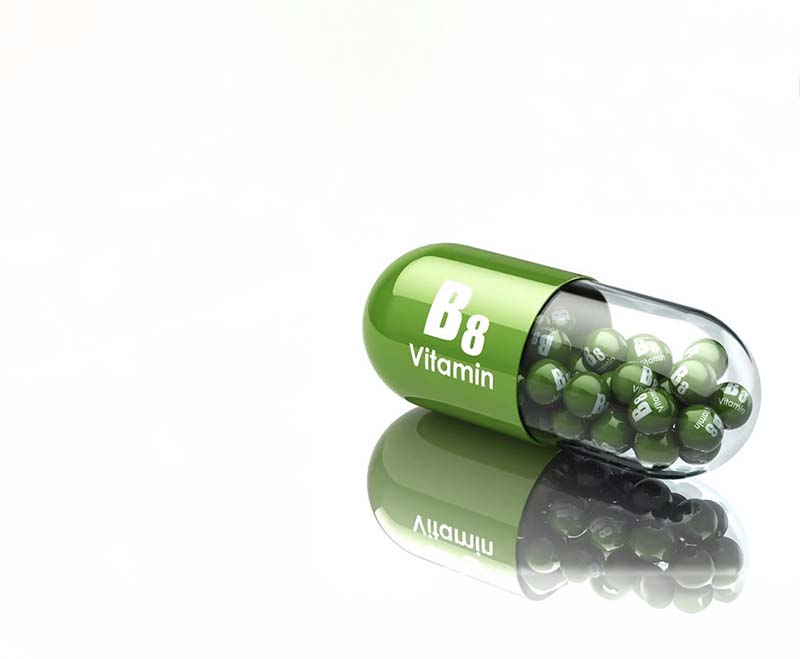
1. Understanding Inositol – What is Vitamin B8?
Inositol, sometimes called vitamin B8, is not really a vitamin but a type of sugar that’s important for our health. It helps make up the walls of our body’s cells. Inositol also plays a role in controlling blood sugar by affecting insulin, a hormone that manages blood sugar levels. It also has an impact on brain chemicals like serotonin and dopamine, which are important for our mood and feelings.
Most people in the US get about 1 gram of inositol in their diet every day, mainly from foods like whole grains, beans, nuts, and fresh fruits and vegetables. When people take inositol as a supplement, they usually take more than what they get from food. Studies have looked at taking up to 18 grams of inositol per day and found it can be helpful and doesn’t usually cause problems.
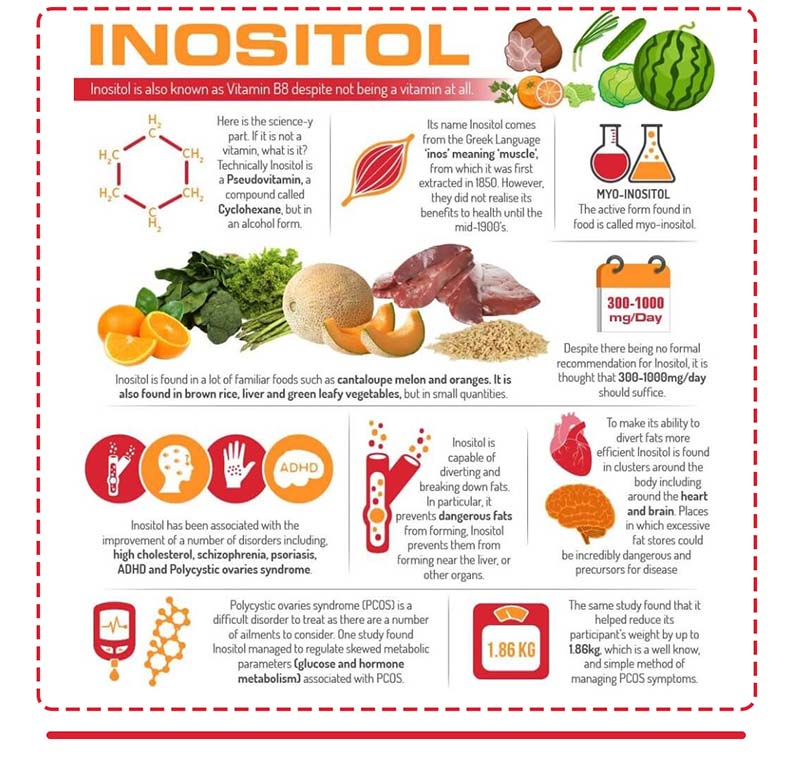
2. The Impact of Inositol on the Body
Inositol plays a significant role in various bodily processes and has potential health benefits. Here are some of Vitamin B8 benefits:
2.1 Potential Mental Health Benefits
Inositol may play a key role in balancing brain chemicals linked to mood, like serotonin and dopamine. This is particularly interesting as lower inositol levels have been noted in individuals with depression, anxiety, and obsessive-compulsive disorders. Although more research is needed, inositol is showing promise as a potential alternative treatment for these mental health issues, with fewer side effects than many traditional medications.
Panic Disorder: Limited studies suggest that inositol supplements might be effective in treating panic disorder, a severe anxiety condition characterized by sudden intense fear, rapid heartbeat, and dizziness. In a study, individuals taking an 18-gram inositol supplement daily experienced fewer panic attacks compared to those on standard anxiety medication. Another study with a 12-gram daily dose also reported reduced frequency and severity of panic attacks.
Depression: The effectiveness of inositol in treating depression has shown mixed results. Some studies indicate improvements in depression symptoms with a daily 12-gram supplement, while others haven’t found significant benefits. Thus, it’s too early to conclusively determine its impact on depression.
Bipolar Disorder: Research is still emerging, but initial studies are promising. For instance, a small study found that a combination of omega-3 fatty acids and inositol reduced symptoms of mania and depression in children with bipolar spectrum disorders. Additionally, inositol may help alleviate psoriasis symptoms caused by lithium, a common bipolar medication.
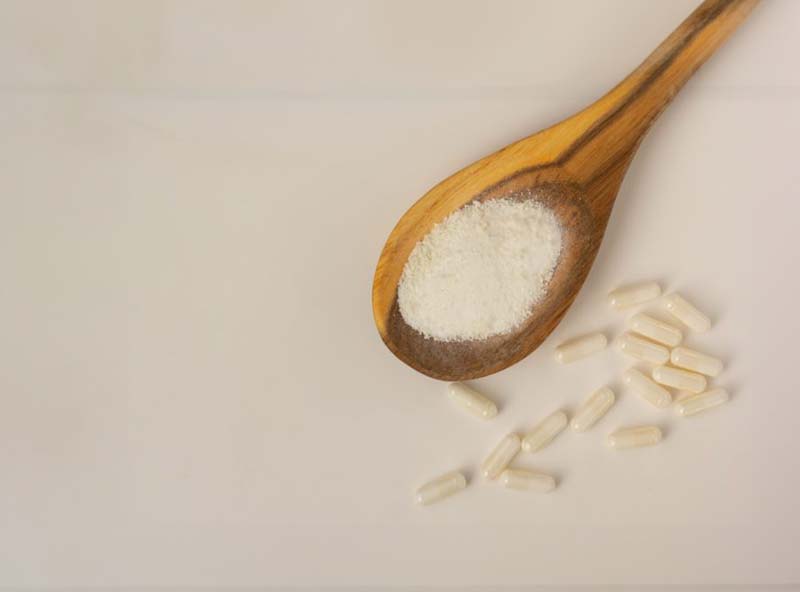
2.2 Alleviate Symptoms of Polycystic Ovary Syndrome
Inositol supplements, particularly when combined with folic acid, may offer relief from Polycystic Ovary Syndrome (PCOS) symptoms. This hormonal disorder can lead to irregular periods, infertility, weight gain, and high blood sugar. Studies have shown that inositol and folic acid can reduce blood triglyceride levels, improve insulin function, and may even induce ovulation in women with PCOS-related fertility issues.
2.3 Control Metabolic Syndrome Risk Factors
Inositol supplements might be beneficial for those with metabolic syndrome, a cluster of conditions increasing the risk of chronic diseases like heart disease and type 2 diabetes. A year-long study in women with metabolic syndrome showed that inositol significantly reduced blood triglyceride and cholesterol levels and improved blood pressure and sugar levels. Impressively, 20% of participants no longer met the criteria for metabolic syndrome by the study’s end.
2.4 Potential Prevention of Gestational Diabetes
Gestational diabetes, a form of high blood sugar during pregnancy, affects up to 10% of pregnancies in the US annually. Inositol has been linked to insulin function, crucial for blood sugar regulation. Some studies suggest that inositol combined with folic acid might help prevent gestational diabetes, though more research is required to confirm this.
2.5 Other Potential Benefits from Inositol
Inositol is being explored as a treatment for various conditions:
- Respiratory Distress Syndrome: It may help preterm infants with breathing problems due to underdeveloped lungs.
- Type 2 Diabetes: Preliminary research shows that inositol with folic acid can aid blood sugar control.
- Obsessive-Compulsive Disorder (OCD): A small study suggests that inositol might reduce OCD symptoms.
Note: While inositol shows potential in various health areas, it’s important to consult healthcare professionals before starting any new supplement, especially for those with existing health conditions or on other medications. This ensures safety and appropriateness for individual health needs.
3. Is Inositol Safe?
Inositol is generally seen as safe by healthcare professionals when used in small doses for a period of up to 10 weeks. However, it’s important to remember that inositol supplements should not replace any medications prescribed by your healthcare provider. Before making any changes to your medication regimen, it’s crucial to consult with your healthcare provider. Inositol can often be included as an additional part of your treatment plan.

When taking inositol supplements, you might notice some mild side effects. These can include:
- Diarrhea
- Nausea
- Stomach pain
- Tiredness
- Headaches
- Feeling dizzy
While these side effects are usually not severe, it’s important to monitor your body’s response to inositol. If you experience any discomfort or unusual symptoms, it’s advisable to discuss this with your healthcare provider. They can provide guidance on whether to continue the supplement or adjust the dosage. Remember, supplements should complement your health regimen, not cause additional stress or discomfort.
4. Unwanted Side Effects from Inositol
Inositol supplements are usually well-received by most individuals. However, when taken in higher doses, specifically around 12 grams daily, some mild side effects have been observed. These can include feeling nauseous, experiencing gas, having trouble sleeping, headaches, dizziness, and feeling tired.
In studies involving pregnant women, taking up to 4 grams of inositol daily did not show any harmful effects. Nonetheless, further research is required in this specific group to ensure complete safety.
The safety of inositol supplements for breastfeeding mothers hasn’t been extensively studied yet. Interestingly, breast milk is naturally high in inositol.
The long-term safety of inositol supplements is still a bit of a question mark. In most research, inositol was used for a year or less. Therefore, the effects of using it over a longer period are not fully understood.
Note: It’s always a smart move to consult with your doctor before starting any supplement, including inositol. This is especially important if you’re pregnant, breastfeeding, or have any existing health conditions. Your doctor can provide personalized advice and ensure that the supplement fits well with your overall health plan.
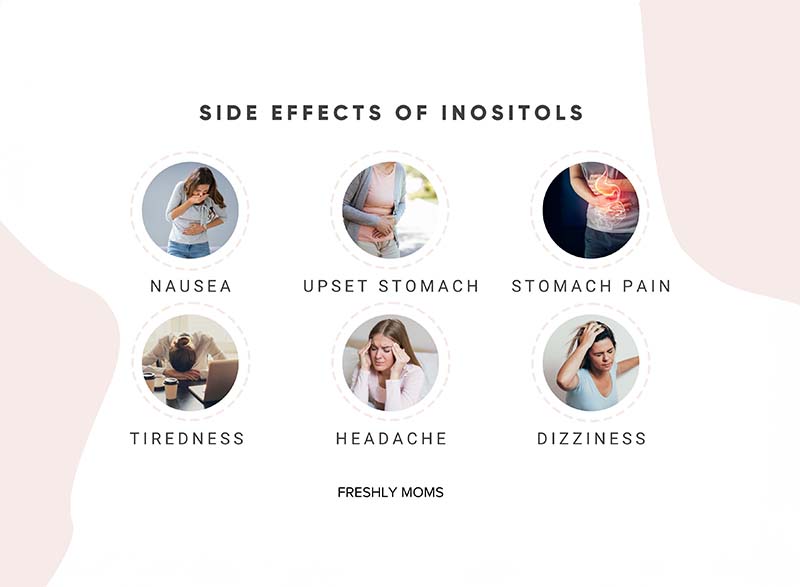
5. Recommended Dosage for Inositol
Inositol supplements come in two types: myo-inositol (MYO) and D-chiro-inositol (DCI). Different amounts work for different health issues, according to research:
- For mental health: 12 to 18 grams of MYO once a day for 4 to 6 weeks.
- For polycystic ovary syndrome (PCOS): Either 1.2 grams of DCI every day, or 2 grams of MYO with a small amount (200 micrograms) of folic acid, twice a day for 6 months.
- For metabolic syndrome: 2 grams of MYO, taken two times a day for one year.
- For controlling blood sugar during pregnancy (gestational diabetes): 2 grams of MYO and a small amount (400 micrograms) of folic acid, twice a day during pregnancy.
- For controlling blood sugar in type 2 diabetes: 1 gram of DCI with a small amount (400 micrograms) of folic acid, once a day for 6 months.
These amounts have shown to be helpful for these health issues in the short term, but we need more research to be sure they are safe and work well over a long time.
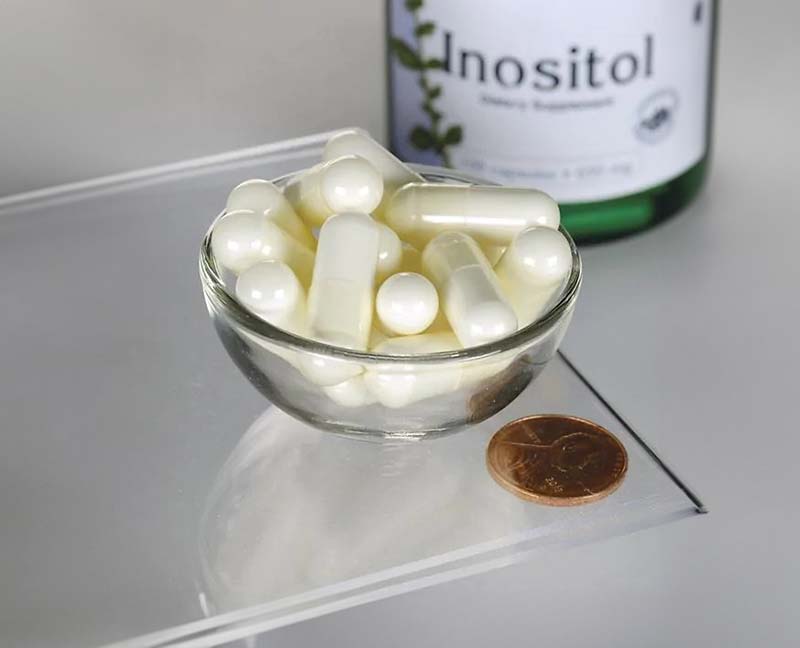
6. Conclusion
In conclusion, while often mistakenly labeled as Vitamin B8, Inositol offers a variety of potential health benefits, ranging from improving mental health conditions to managing symptoms of PCOS and metabolic syndrome. Understanding the different types and dosages, like MYO and DCI, is crucial in harnessing the full potential of this supplement.
We’d love to hear your experiences and stories about using Vitamin B8 (Inositol). Your feedback not only enriches our community’s knowledge but also helps others who are considering this supplement for their health needs. So, feel free to share your stories in the comments below.
For more insightful content like this, don’t forget to check out our other blogs at Biosculpture. We’re committed to bringing you the latest and most reliable information in the world of health and wellness. Stay informed and stay healthy!
7. FAQ
Can inositol cure autism?
No, inositol has not been found effective in treating autism. It shows potential benefits for depression, panic disorder, and obsessive-compulsive disorder (OCD), but not for schizophrenia, Alzheimer’s disease, ADHD, or autism.
Does inositol cause weight gain?
There is no direct evidence linking inositol to weight gain. A few women in a polycystic ovary syndrome (PCOS) study experienced weight gain while using inositol, but this was not widespread and may not apply to the general population. The weight gain could also be due to other factors.
Who should take inositol?
Inositol may benefit those with certain mental health and metabolic conditions, such as panic disorder, depression, bipolar disorder, PCOS, metabolic syndrome, and diabetes. It’s generally safe for most people, with mild or no side effects at daily doses up to 18 grams.


